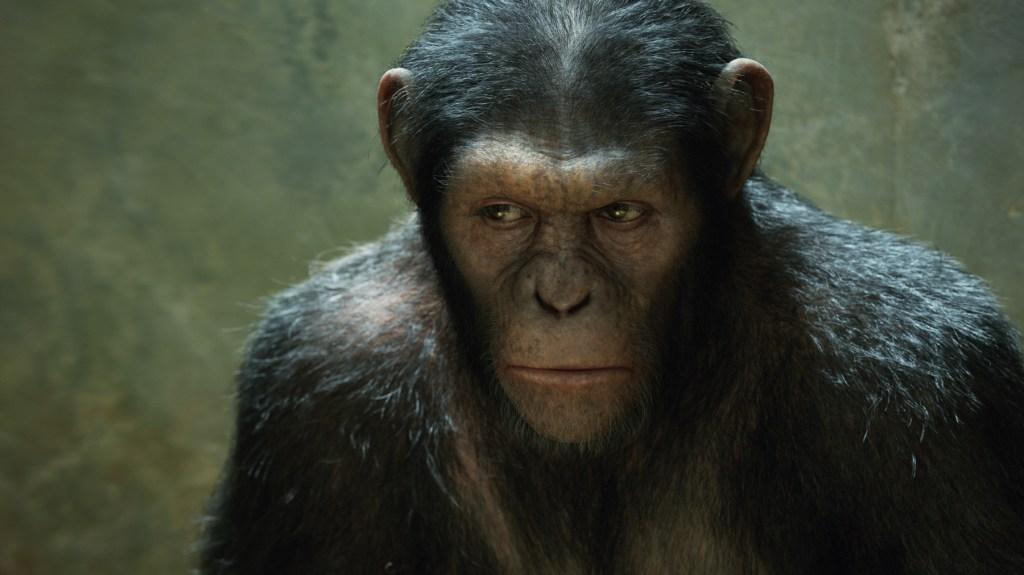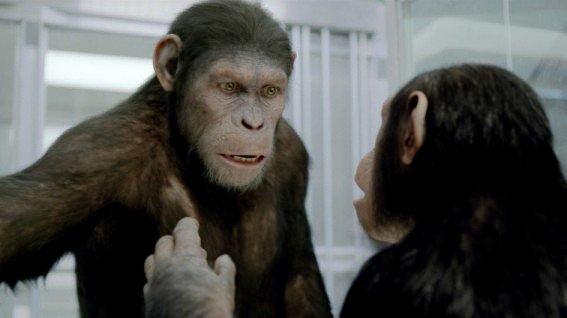
So where were we? Ah yes, catching up on movie reviews. To close that circle (for now), and as you might have heard, Rupert Wyatt’s admirably low-key Rise of the Planet of the Apes — a.k.a. the first half of Roddy McDowell remake month — is a better unnecessary-prequel than anybody really had a right to expect.
I do wish I’d seen Rise before word leaked out that the movie was surprisingly good, because — going in with higher expectations — I mostly felt like I was just sitting through an extended version of the movie’s trailer. Still, allowing for some iffy science throughout, this sixth Apes film turned out to be a decently smart and engaging evening of late-summer cinema. And as a genre B-movie with a patina of political subtext, I’d say it hits at about the level of the Spierig’s pharmaceutical vampire thriller Daybreakers.
As you probably know by now, Rise of the Planet of the Apes tells the story of Caesar (Andy Serkis), a chimpanzee made extra-smart in the womb by an experimental Alzheimer’s drug concocted by a Dr…oh let’s just call him James Franco. When this project gets shut down — the maternal protectiveness of Caesar’s mom Bright Eyes (wink, wink) is misinterpreted as a hyper-aggressive side effect of the drug — Dr. Franco brings Caesar home to live with him and his ailing father (John Lithgow) instead. There, he is raised, Project Nim-style, by the good doctor and his dad, and cute, ethically-minded zoo veterinarian Caroline (Freida Pinto of Slumdog Millionaire) eventually makes four.
But, as Doctor Caroline perennially intones, one should not tamper with the forces of nature. (Ok, sure. But let’s not overstate the case — or should we have something against pasteurized milk?) And, as Caesar grows older and more leery of playing the pet, his chimp tendencies begins to manifest themselves more and more often. Meanwhile, after showing signs of promise under the original medication, Papa Lithgow’s Alzheimers begins to take hold again. This forces Dr. Franco to experiment with more virulent and aggressive forms of his wonder drug, and makes Lithgow even more feeble and disoriented on a daily basis — and we already know what happens when chimps on this particular drug feel overprotective. One way or another, it’s clearly about to get all Frankenstein up in here.
That gets us to about the end of the first act, which is easily the most conventional and weakest portion of the film — not the least because none of the humans make much of an impression. I’m not a James Franco hater — he was in Freaks & Geeks, after all — and I think he gets way too much grief for slumbering through the Oscars last spring. (What can you do? It’s a thankless gig anyway.) That being said, he does seem sorta disengaged, and even bored, throughout this picture. For her part, Pinto makes even less of an impression — She’s a complete non-entity. And the rest of the humans basically only have one note to play, be it John Lithgow and his dementia or Franco’s boss at the pharmaceutical company (David Oyelowo) twirling his moustache.
All that being said, Rise takes it up a notch in Act II, when Caesar finds himself consigned to San Francisco’s primate prison(?), run by the father-and-son team of Brian Cox and Tom “Draco Malfoy” Felton. (Surprisingly, given his scenery-chewing turns in movies like Troy, Cox underplays it, while Felton is suitably Malfoyish — albeit with a quality American accent.) In this ape Alcatraz, Caesar is thrown head-first into the deep end of chimpanzee society — No more sweaters, college boy! Instead, he must survive the prison yard, learn the power dynamics, and figure out how to befriend the key allies, such as a former circus orangutan and a belligerent ape, he will need to make good his escape.
This isn’t A Prophet, exactly, and to be honest — even with all the impressive WETA work on display here — I could never really suspend my disbelief enough to accept Caesar as a real, honest-to-goodness chimp. (The apes and orangutans work better.) Still, the monkey Shawshank stuff in this middle third of the movie is surprisingly compelling, and it put me in a good mood for the final act, when Rise finally lets its funky-monkey freak flag fly. (I won’t give away what happens here, but like the rest of the narrative, it’s pretty well telegraphed by the trailer.)
My only real complaint, is that I might’ve done more with the Soderberghian ALZ-113 angle here, but I guess one can figure out for themselves what happens next, and/or they were saving that for the sequels. Return of the Rise of the Planet of the Apes, anyone?

